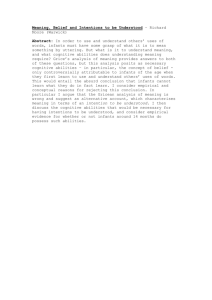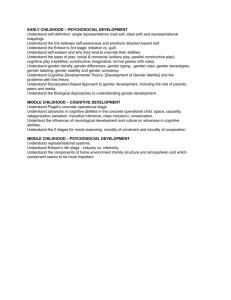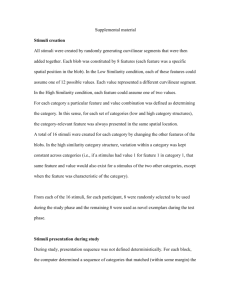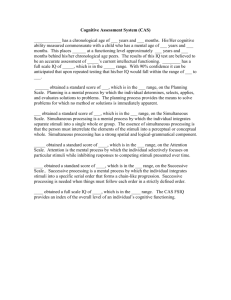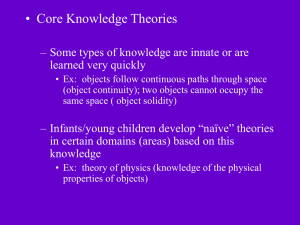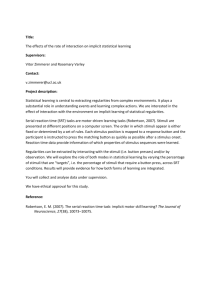Cognitive Development: Information Processing & Memory
advertisement
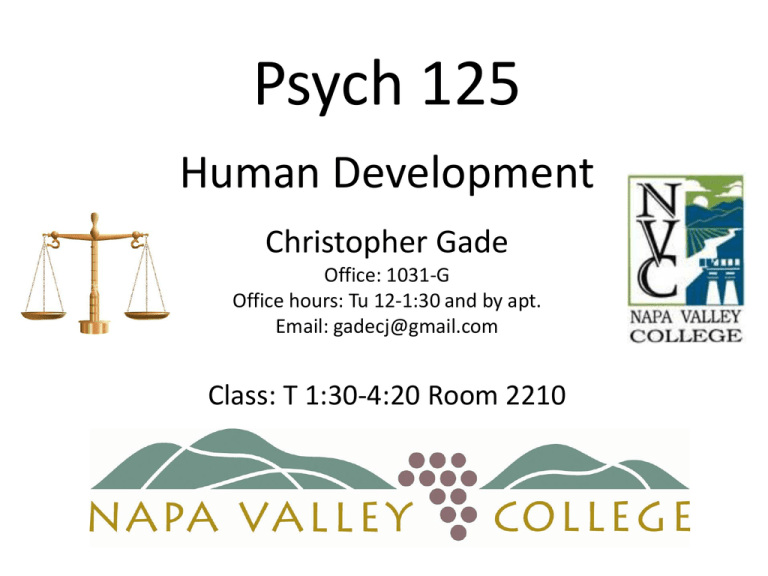
Psych 125 Human Development Christopher Gade Office: 1031-G Office hours: Tu 12-1:30 and by apt. Email: gadecj@gmail.com Class: T 1:30-4:20 Room 2210 Class Activity • To explore today’s topic, we’re going to start today’s class with an activity. Follow along as fast as you can. Stand up and clap two times! • Spin around one time • Hop on one foot three times • Say the name of your best friend in the eight grade aloud • Say the name of the first US president aloud Say the number of finger that I’m holding up with my right hand! 7 How did you do all of this? • Information processing – the act of attending to, monitoring, processing, manipulating, and creating strategies for handling stimuli from the environment – Attention – the focusing of mental resources on stimuli – Encoding – the organization and recognition of stimuli – Memory – the retention of information from stimuli over time – Thinking – the processing and manipulation of memory over time How does this relate to development? • As we age, the speed and ease with which we perform these processes changes – Automaticity – the ability to perform a cognitive process with little or no effort – The faster and the more automatic we are, the easier it is to navigate in our environment Looking Closer at the Steps: Attention • Attention is often split up into four different types – Selective attention – the ability to focus on a specific stimulus while ignoring other stimuli – Divided attention – the ability to focus on multiple stimuli at the same time – Sustained attention – the ability to maintain attention for a prolonged period of time – Executive attention – the ability to control and allocate attention intentionally • As we age, our attention capabilities change in a number of ways Attention Skills During Infancy • Infants have the ability to focus their attention for a short period almost immediately after birth • Most attention is based on the novelty of stimuli – Habituation – decreased responsiveness due to prolonged or repeated exposure to a stimulus – Dishabituation – an increase in attentiveness due to a change in a familiar stimulus • After about three months, infants start to gain the ability to direct their attention at specific elements • From three months on, infants also increase their ability to prolong their attention to stimuli (starting at 5 to 10 seconds) Another Aspect of Attention in Infants • Joint attention – the ability to focus on multiple objects that are associated with each other • Joint attention starts at about 8 months of age • At 11 months of age, infants begin to master “gaze following” • This ability is critical in our attempts to learn about our environment “Blorg” • A lack of joint attention skills is often used as an indicator of cognitive problems Attention Changes in Childhood • At childhood, our ability to maintain our attention increases dramatically – Television example • We also master our ability to change our attention from one stimulus to another • However, we continue to struggle with some critical aspects of attention – Salience recognition – the ability to recognize the critical aspects of a stimulus – Planfulness – the ability to shift attention between stimuli in a planned and advanced manner Identify and Count the Number of Differences Between the Pictures Attention during Adolescence • As we enter adolescence, we become more capable of directing our shift of attention • We also focus our attention on important details more easily • We also begin to multitask – Multitasking – the ability to dedicate our attention to multiple stimuli – Note: as we age, we slightly improve our ability to multitask, but we never become great at multitasking, we just become more confident in our abilities Attention in Adulthood • Most of us become very good at attention skills when we reach adulthood • There are considerable differences in attention skills of individuals based on training and general abilities • As we get older, our attention abilities decrease – Our ability to divide our attention becomes much worse – We gradually lose the ability to ignore unimportant information – We also appear to lose our ability to maintain attention for very long when information is difficult – Experience and cognitive activity seem to have a large impact on the rate of this decline The Second Aspect of Information Processing: Memory • Just like attention, memory abilities change as we age – Capacity – the amount of information that we can process – Span – the length of time that we can process information – Organization • Schemas – concepts of information organization that impact the way we encode, store, and retrieve information – Speed/ease of retrieval Different Stages of Memory • Memory is often broken up into three different levels – Sensory memory – the retention of information in our immediate environment • Lasts for only fractions of a second • Information that we deem relevant in this stage progress to STM – Short-term memory (working memory) – the retention of and attention to information that we are currently using • STM involves both current information AND past information – Long-term memory – the retention of information that we can recall readily, even if it isn’t a current need • LTM is constantly changing due to new experiences and needs Sensory input External events Attention to important or novel information Sensory memory Encoding Short-term memory Encoding Retrieving Long-term memory One Final Classification of Memory • Implicit memory – memory of information without conscious recognition • Explicit memory – conscious memory based on facts (true or false) and experiences (real or imagined) – Semantic and episodic differences memories Explicit (declarative) With conscious recall General knowledge (“semantic memory”) Personal events (“episodic memory”) Implicit (nondeclarative) w/o conscious recall Skills-motor and cognitive Dispositions, automatic learned associations Memory in Infants • The majority of developmental psychologists over the years argued that infants had no memory • Nowadays, we tend to argue that infants have very limited memory – Memory at this time is implicit based • Mobile experiment – Memory span is very short, but improves • 6 months 24 hours • 20 months 1 year – Infantile amnesia – the inability of adults to remember anything from their infancy (0-3 years) • Believed to be related to a lack of language skills and lack of development in the frontal lobe and hippocampus Memory in Childhood • Children begin to master the ability to store information in LTM • They also improve on their ability to access specific information in their long-term memory as they age • Short –term memory span also increases – Note: even though their ability to remember improves, the process of remembering information is very difficult and often muddled or erratic in children • False memories through suggestion studies • Randomness of information that is remembered – “tell me about your day” – Memory or story-telling related? Memory after Childhood • As we age, studies show that our working memory skills and capacity improve up to the age of 45, then they slowly decline • We appear to remember less events about our own experiences that occur after about 50, and our ability to remember events also declines • However, we seem to have about the same memory capacity for semantic information throughout our lifetimes Problems with Memory as We Age • Memory capacity and speed of access decline with age, but there are some other interesting changes to memory that we also find • Source memory – the information about the location, audience, and time associated with the learning of information • Prospective memory – the ability to remember to do something in the future (involves routine) Development in Other Thinking Skills • Categorization – the ability to classify stimuli and concepts into distinct groups – We appear to possess this skill at a young age, and get more specific through experience and demands • Critical thinking – the ability to master the deeper meaning of ideas – Applications of learned information – Connections between information – We improve on with age, but experience is critical • Problem solving – finding ways to appropriately obtain a goal – Children learn strategies through testing, adults tend to rely on previous strategies that worked Looking Back at an Old Concept • Automaticity – the ability to perform a cognitive process with little or no effort • The faster and the more automatic we are, the easier it is to navigate in our environment • The older we get, the more automatic our behaviors become • This usually makes life easier, HOWEVER, this also causes us to struggle with problem solving • It also doesn’t help us at times with decision making (especially when we’re teens) The BENEFITS of Aging • Unlike physical and health development, when we age, there are some big benefits in our later years – Expertise – having extensive, highly organized knowledge and understanding of a particular domain – Decision making: when given time, the elderly have the ability to make much better decisions than their younger counterparts – education, health, and work effects: our thinking abilities appear to be able to maintain themselves fairly well throughout life if we find ourselves in environments that continue to push and not damage our mental skills Summing Things Up • In this class, instead of looking at cognitive development in specific stages, we examined how our cognitive abilities grow and shift over the lifespan – We saw that we become more diverse, fast, and efficient with most cognitive abilities as we age – We also saw that our experience and demands have a great impact on how we develop and the extent of the development Moving on… • In the next class we’ll explore the topic of intelligence. Make sure that you have the chapter read by then. • Note: the next assignment will also be posted by the end of this week. Please make sure to download it and start on it as soon as possible. Please remember, your person needs to go through an entire lifetime, and you’re responsible for EVERY section that’s on the assignment.
